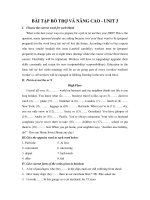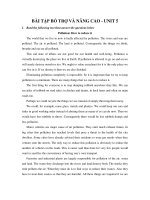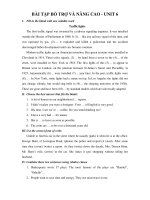BÀI TẬP BỔ TRỢ VÀ NÂNG CAO - UNIT 8 pot
Bạn đang xem bản rút gọn của tài liệu. Xem và tải ngay bản đầy đủ của tài liệu tại đây (63.69 KB, 6 trang )
BÀI TẬP BỔ TRỢ VÀ NÂNG CAO - UNIT 8
I. Fill in the blank with one suitable word
Samuel Morse, the (1)… of the telegraph, was born in 1791 at Charlestown, in the
United States of America. When he was a young man, he liked painting. He studied art in
London. When he returned to America, he opened a (2)… in Boston and worked as a
portrait painter.
In 1829 Morse sailed (3)… Europe to study classic art in Italy. He was an artist and
knew little about science. But at the age forty-one, far out in the Atlantic Ocean, his life
(4)… the ship sailing from France to New York carried many passengers, among (5)…
was Dr. Jackson. He told Morse that electricity could pass through any length of wire.
Morse firmly believed that if electricity could be found in any part of a long wire, it could
be used messages. Soon he began to work out a way to send messages. He wanted to
make an instrument that could send messages instantly to any (6)… of the world. Morse
thought, if my message can go ten miles without stopping, I can make it go (7)… the
world”. He made hundreds of experiments but he had had little knowledge on electricity
and couldn’t (8)… progress.
Morse had idea of making a relay and using a number of such relays for sending weak
signals for a long (9)… So the first real telegraph was born.
On May 24
th
, 1844 the first message ever sent over wires (10)… from Washington to
Baltimore.
Morse was not only the first to produce a practical telegraph, but he was a pioneer of
the (11)… widely used electrical communication in the world today.
Morse worked out his famous alphabet or code of dots and dashes. The sender taps
out the words in Morse code.
Telegraph lines began to go up all over the world. Morse and his assistants did a good
deal of work on the submarine cable (12)… that message could be telegraphed across the
ocean.
II. Use the correct form of verbs:
A. Laser light can be used for (transmit) power. Electrical power (transfer) to laser light.
At the end of the distant beam, the reverse process takes place. Because fog or rain would
interfere with transmission on earth, lasers (must beam) though evacuated pipelines
(prevent) power loss. These pipelines must be perfectly straight in order to accommodate
the arrow-like laser beam. Mirrors (require) to allow the beams (change) directions and
go around corners.
B. It may be impossible (persuade) my mother (give) up her job even though she’s
having health problems. We can’t even get her (cut) down on her working hours. She
enjoys (work) so much that she refuses (retire) and take it easy. I admire her for
(dedicate) to her work, but I also want her to take care of her health.
III. Use the correct form of words:
Present giving
Presents and present (1.give) should be fun. The whole idea of giving a present is that
you should enjoy planning an especial pleasure and surprise for someone. The value of a
present is the (2.little) important thing about it. What matters is that a token of your love
and appreciation of the person. Those who never give anything away, not even
(3.sympathetic), are sure to be (4.appoint) and (5.happy) people.
An ideal present should be something one will like and want, not just something you
like. Everyone has simple tastes (6.expensive) to buy or easy to make. The (7.simplicity)
present is often the most (8.appreciate). The most (9.success) present (10.give) I know
shop all the year round for presents. They see just the right present for a friend, buy it
then and there at once put it away till it is wanted. In this case, I suggest you keep a list of
suitable presents for your friends so that when the time comes, you can go out to buy
something special.
IV. Rewrite the sentences
1. I’ll let you borrow the book but you must promise to return it next week
If
2. Belgium is a far less mountainous country than Austria.
Austria has
3. It isn’t pleasant to be alone in a strange country, is it?
It’s
4. You can’t say anything that would persuade me to live overseas
Nothing
5. I’d do anything to prevent him from going there
There’s
6. All the people in France speak French
There’s nobody
V. Choose the best answer
Compact discs (CDs) have revolutionized the music industry with their surprisingly
realistic sound. The six-inch discs look like thin plastic sandwiches with aluminum in the
center. They have digitally recorded material that is read by laser beams, so the sound has
none of the cracking of vinyl records. CDs are also virtually indestructible, and they are
lighter and smaller than conventional records (LPs). Since their introduction, CDs have
become more affordable and widely available. In fact, they are now sold in electronics
and video stores that haven’t formally carried records or cassettes.
There has been a phenomenal growth in the sale of CDs. Sales climbed dramatically
during the second half of the 1980s. In the 1900s, sales have been even greater. CDs have
all but replaced LPs in stores and, in spite of their being less affordable than cassettes,
continue to gain in popularity.
1. The main appeal of CDs is their:
A. price B. size C. availability D. sound
2. The word “revolutionaries” could be replaced by
A. changed B. fought C. surprised D. marked
3. This passage states that it is difficult to
A. play a CD B. produce a CD C. record a CD D. destroy a CD
4. The phrase “all but” could best be replaced by
A. completely B. gradually C. nearly D. surprisingly
5. According to this passage, which one of the following is true?
A. new kinds of stores are selling CDs
B. CDs are as available as cassettes
C. Stores are selling more CDs than cassettes
D. Stores are losing money on their cassettes
6. The author’s man purpose is to
A. tell how CDs are make
B. discuss the growth of CDs
C. compare CDs to sandwiches
D. describe the stores that sell CDs
VI. Select the word to fill into the blanks. Change the form of words if necessary
breed
finance
scrub
broadcast
shove
wind
drag
expose
redecorate
scratch
lean
1. The Clark’s living room is being … in blue and white. They want it to look nice for
their daughter wedding reception
2. On your trip to Tahiti, you will be … to many interesting customs, delicious food, and
delightful people
3. My hands and knees got sore while I was … the floor with soap and water
4. The old clock wasn’t ticking because it hadn’t been … . Someone forgot to do it
5. The news of the victory was … throughout the country over the radio and television.
Everyone heard about it almost as soon as it happened
6. Oil exploration costs a lot of money. The exploration in the southern part of the
country are being… by the government
7. Frank was resting. He has been … back on his chair for several minutes with his
eyes closed when he heard a knock on the door
VII. Rearrange the sentences to form a logical passage
1. First of all, wrap a strip of paper around the copper rod
2. Then, examine the paper
3. The following experiment shows that copper is a better conductor of heat than wood
4. Now repeat the same procedure with wooden rod
5. You will need to assemble: two strips of paper, a copper rod, a wooden rod, and a
candle
6. This simple experiment proves that copper conducts better heat than wood
7. Notice that this time the paper scorches
8. After that hold the rod above the burning candle for two seconds
9. You will notice that did not burn.
VIII. Read the passage and fill in the blank:
Is There Life on Earth?
There was great excitement on the planet of Venus this week. For the first time
Venusians scientists managed to land a satellite on the plant Earth, and is has been
sending back signals as well as photographs ever since.
The satellite was directed into an area know as Manhattan (named after the great
Venusians astronomer Prof. Manhattan, who first discovered it with his telescope 20,000
light years ago).
Because of excellent weather conditions and extremely strong signals, Venusian
scientists were able to get valuable information as to the feasibility of a manned flying
saucer landing on Earth. A press conference was held at the Venus Institute of
Technology.
“We have come to the conclusion, based on last week's satellite landing,” Prof. Zog
said, “that there is no life on Earth.”
“How do you know this?” the science reporter of the Venus Evening Star asked.
“For one thing, Earth's surface in the area of Manhattan is composed of solid concrete
and nothing can grow there. For another, the atmosphere is filled with carbon monoxide
and other deadly gases and nobody could possibly breathe this air and survive”
“Are there any other hazards that you discovered in your studier?”
“Take a look at this photo. There seems to be a river, but the satellite findings indicate
it is polluted and the water is unfit to drink. This means we shall have to carry our own
water, which will add even greater weight to the saucer.”
“Sir, what are all those tiny black spots on the photographs?”
“Prof. Zog, why are we spending billions and billions of zilches to land a flying
saucer on Earth when there is no life there?
“Because if we Venusians can learn to breathe in an Earth atmosphere,
then…………………………………………………………………………………………
ANSWER FOR UNIT 8
I. 1. inventor 2. studio 3. for 4. changed 5. whom 6. part 7. round 8. make 9. distance 10.
traveled 11. most 12. so
II. A. 1. transmitting 2. is translated 3. must be beamed 4. to prevent 5. are required 6. to
change
B. 1. to persuade 2. to give 3. to cut 4. working 5. to retire 6. dedicating
III. 1. giving 2. least 3. sympathy 4. disappointed 5. unhappy 6. inexpensive 7. simplest 8.
appreciated 9. successful 10. givers
IV. 1. If you promise to return the book next week, I’ll let you borrow it
2. Austria has far more mountains than Belgium
3. It’s unpleasant to be alone in a strange country, isn’t it?
4. Nothing but you say would persuade me to live overseas
5. There’s nothing I wouldn’t do to prevent
6. There’s nobody in France who doesn’t speak French
VII. 1D 2A 3D 4C 5A 6B
VIII. 1. redecorated 2. exposed 3. scrubbing 4. wound 5. broadcast 6. financed 7. leaning
8. stretched
X. 3 – 5 – 1 – 8 – 2 – 9 – 4 – 7 – 6







